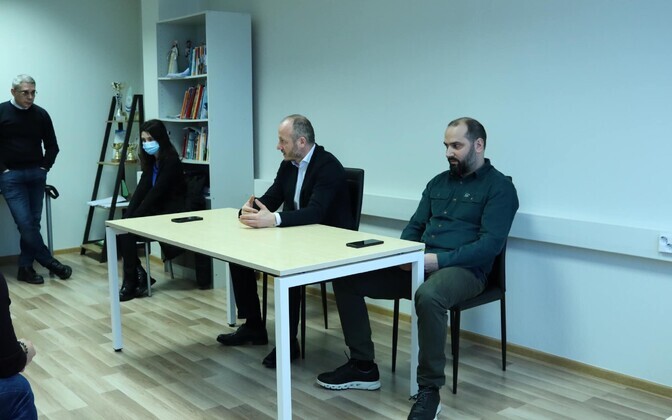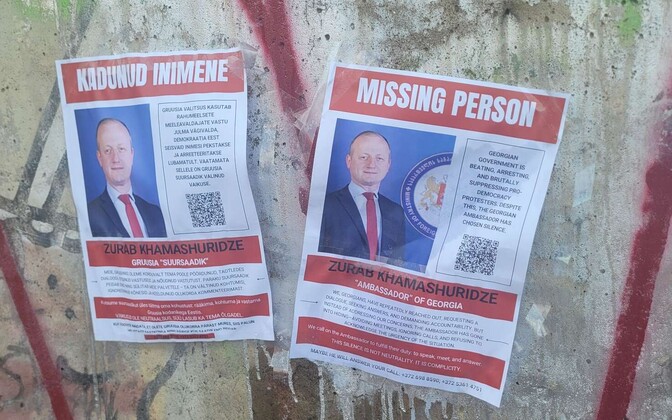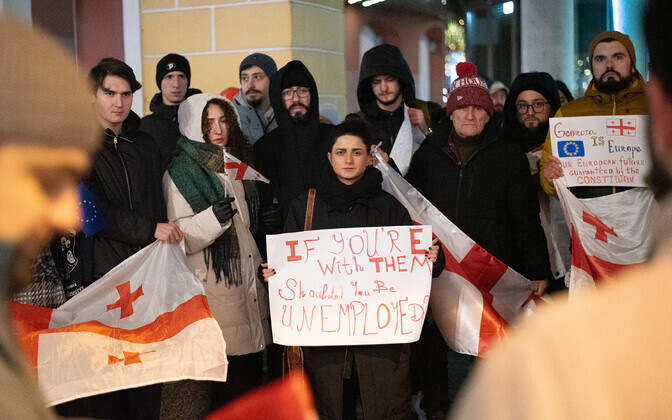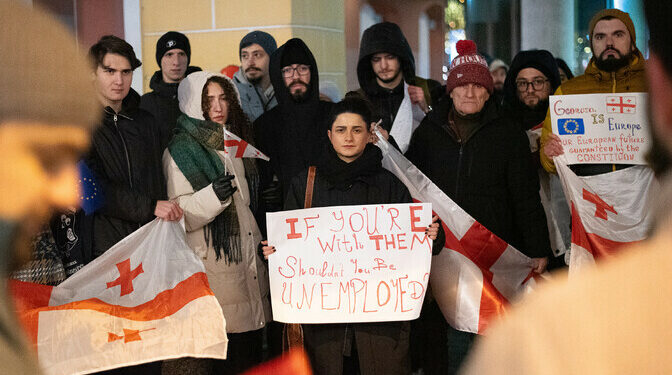“The ideal solution to this crisis would be for Georgian Dream to compromise and schedule an election in the coming months,” according to Khorava. However, he believes the ruling party will not be willing to “put national interests above its own.”
When it comes to Estonia, Khorava pointed out that its relationship with Georgia has been close since both countries regained independence from the Soviet Union.
“Georgian people remember the presence of Estonian President Toomas Hendrik Ilves in the capital during the August War of 2008,” Khorava said, adding that the current sanctions against Georgian government officials “stand in the spirit of this age-old support Estonia has for the democratic aspirations of the Georgian people.”
***
Vakhtang Chkhenkeli is from Georgia’s Abkhazia region and now lives in Tallinn. Like Khorava, he has also participated in several previous protests back home, including those against the introduction of the Russian-inspired “foreign agent” law.
Chkhenkeli told ERR News that the events now unfolding in Georgia have left him with a feeling of “hopelessness.” “The situation is getting worse and worse every day,” he said. “We always think this is the last thing they can do, that there is a red line that they’re not going to cross. But every day this red line is crossed.”
“I feel that there is no justice in any way,” Chkhenkeli continued, adding that in general, the situation gives him the same feeling as if “someone has died close to me and there is nothing you can do.”
 Georgian Ambassador to Estonia Zurab Khamashuridze meets with the local Georgian community Source: Gruusia Maja Eestis
Georgian Ambassador to Estonia Zurab Khamashuridze meets with the local Georgian community Source: Gruusia Maja Eestis
On Saturday, December 14, Chkhenkeli was among the members of Estonia’s Georgian community, who met with the country’s Ambassador to Estonia Zurab Khamashuridze. The meeting was organized by Gruusia Maja (Georgian House), an umbrella organization representing different Georgian organizations in Estonia.
Chkhenkeli told ERR News he joined the meeting because, like many other people from his country now living in Estonia, he is “an ordinary Georgian, who is terrified of what’s going on in Georgia.”
In the week prior to the meeting, posters had appeared around Tallinn and Tartu depicting the Georgian ambassador as a “missing person.” According to a post on Gruusia Maja’s social media page, there had been no communication between Khamashuridze and the organization’s board or other Georgians in the two weeks since the protests began.
Chkhenkeli said those who put up the posters “wanted Estonians and people living in Estonia to see that he isn’t doing anything, and also to do something eye catching. So, it was good, I think,” adding that during Saturday’s meeting, the ambassador “mentioned that this didn’t affect his decision to talk to us.”
However, not all members of Tallinn’s Georgian community thought the posters were the right way to get the ambassador’s attention, Chkhenkeli explained. Some said it was “shameful” for them to be put up outside Tallinn’s Russian Embassy for example.
“But I think this is where he belongs. If you serve a government who does everything against their people, it’s not only about diplomatic relations and representing the country. We told him during the meeting that he represents this party and so he’s as responsible as anyone for those decisions.”
 Posters in Estonia asking for information about “missing person” Zurab Khamashuridze, ambassador of Georgia to Estonia. Source: Michael Cole
Posters in Estonia asking for information about “missing person” Zurab Khamashuridze, ambassador of Georgia to Estonia. Source: Michael Cole
***
Chkhenkeli said that Estonia’s Georgian community did not come away from Saturday’s meeting with answers to their most pressing questions.
“We were trying to stick to the agenda, to talk about current problems, but [the ambassador] tried to shift the discussion into a different field. It was very annoying,” Chkhenkeli said of the meeting, adding that it also got “very loud.”
“We asked [the ambassador] about progress, what has been done to address the issues we have with our foreign partners,” Chkhenkeli explained. “But we got a strange answer – that we are discussing free roaming (not having to pay additional charges to use mobile phone services outside your home country – ed.) between Georgia and the EU or that Georgia is joining SEPA (the Single Euro Payments Area – ed.).”
“People are being tortured in Tbilisi right now, and people are afraid to go out. And we are hearing that we may have free roaming in the future – it’s ridiculous.”
“Every day we are moving further and further away, not only from the European Union but these European values, where human rights are respected and you are not living in a police state.”
***
Chkhenkeli said he is pleased with Estonia’s response to the situation so far, particularly the sanctions against key government officials, and expressed hope that it could pave the way for other EU countries to follow suit.
“I’m really thankful that they are the first country to do this. I don’t know if this will have an actual effect on the people who are sanctioned, but maybe it will open the door for other bigger countries to also sanction them,” he said. “But Estonia can’t do the things that we Georgians have to do.”
On the day Chkhenkeli spoke to ERR News, Georgian Dream released a statement in response to those sanctions stating Estonia and Lithuania have the “least sovereignty” among EU countries and are yet to break free of the Soviet mentality.

In his view, the statement brings into the open, something Georgian Dream have been concealing for a number of years – “that they’re openly anti-Europe, anti-European Union and anti-our-partners. I don’t think anyone in a sane mind would criticize Estonia for being Soviet-minded,” he said.
“This also illustrates how Georgian Dream thinks about our allies,” Chkhenkeli added. “Estonia is probably the biggest ally of Georgia, along with Poland and Lithuania.”
***
As for the next steps, Chkhenkeli believes there is still “a long road ahead.”
“Nobody wants violence,” he said. “I’m from Abkhazia and my family has seen war. We have been living this scene for 30 years. But I’ve never felt so proud as when I attended demonstrations in Georgia, because not a single person had any violence in mind. It was truly a popular protest with kids and people just sitting there talking and demanding what we have been aspiring for. I don’t think this non-violent mindset of people has changed but I don’t know how can we address the violence from the government,” he added.
“You know, we Georgians often think that Georgia is the center of the universe, and everything is decided in Georgia. I realize that it’s not,” Chkhenkeli smiles.
“But hopefully, despite this, Estonians will support us till the end. Because we need outside support. We see that there is a whole state apparatus against the people in Georgia. We can really benefit from the support of our friends abroad.”
—
Follow ERR News on Facebook and Twitter and never miss an update!
Source link : http://www.bing.com/news/apiclick.aspx?ref=FexRss&aid=&tid=6761dba251b146e7b8d8b8f9298d10a5&url=https%3A%2F%2Fnews.err.ee%2F1609548922%2Festonia-s-georgians-discuss-protests-every-day-a-red-line-is-crossed&c=17968236580738195746&mkt=de-de
Author :
Publish date : 2024-12-17 09:18:00
Copyright for syndicated content belongs to the linked Source.


